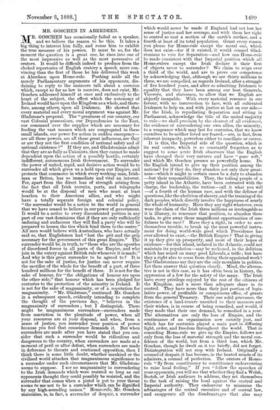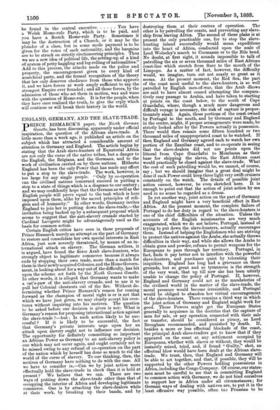MR. GOSCHEN IN ABERDEEN.
MR. GOSCHEN has occasionally failed as a speaker, and we believe the reason to be this. It takes a big thing to interest him fully, and rouse him to exhibit the true measure of his powers. It must be so, for the moment the question is a great one, he rises into one of the most impressive as well as the most persuasive of orators. It would be difficult indeed to produce from the choked repertories of English oratory a speech more con- vincing than the first of those he has delivered this week at Aberdeen upon Home-rule. Pushing aside all the merely Parliamentary arguments of his opponents, dis- daining to reply to the insincere talk about a coercion which, except so far as law is coercive, does not exist, Mr. Goschen addressed himself at once and exclusively to the heart of the subject, the effect which the autonomy of Ireland would have upon the Kingdom as a whole, and there- fore, among others, upon all Irishmen. He showed that everymaterial and every moral argument was against Mr. Glad stone's proposal. The " greatness of our country, our vast Colonial possessions, our Dependencies in the East, our command over the supplies which are necessary for feeding the vast masses which are congregated in these small islands, our power for action in sudden emergency— are all these powers, are all these great influences, are they or are they not the first condition of national safety and of national existence ?" If they are, and Gladstonians admit that they are as fully as Unionists, then they cannot be made dependent upon the action of a possibly hostile, certainly indifferent, autonomous Irish Government. To surrender the power of united, rapid, and decisive action would be to • surrender all which gives us a hold upon our Empire, and protects that commerce in which every working man, Irish- man or Briton, has so immediate and vital an interest. For, apart from the direct loss of strength arising from the fact that all Irish recruits, ports, and telegraphs would be at the disposal of men who must at least hearken to their American allies, and who might have .a totally separate foreign and colonial policy, "'the surrender would be a notice to the world in general that we have ceased to believe in our power of government. It would be a notice to every discontented portion in any part of our vast dominions that if they are only sufficiently enduring and audacious they will find a party who will be prepared to loosen the ties which bind them to the centre." All men would believe with Australians, who have actually said so, that Englishmen had "lost the grit and the grip necessary for the government of this great Empire." The surrender would be, in truth, to "those who are the apostles of disordered forces in all parts of the Empire, and who join in the outcry against British rule whenever it is -made." And why is this great surrender to be agreed to ? It is not for the sake of justice, -for justice can never require the sacrifice of the whole for the benefit of a part, of three hundred millions for the benefit of three. It is not for the sake of honour, for " the obligations of honour are upon the other •side," that honour which has been pledged for centuries to the protection of the minority in Ireland. It is not for the sake of magnanimity, or of a reputation for magnanimity. " Mr. Gladstone," continued Mr. Goschen in a subsequent speech, evidently intending to complete -the thought of the previous day, " believes in the magnanimity of surrenders ; but I distinguish. There might be magnanimous surrenders—surrenders made -from conviction in the plenitude of power, when all your resources are at your disposal, and when, from a sense of justice, you surrender your position of power because you feel that conscience demands it. • But when surrenders are made after you have stated that you con- sider that such a surrender would be ridiculous and dangerous to the country, when surrenders are made at a moment of peril or after defeat, when surrenders are made in deference to threats and continued opposition, then I think there is some little doubt, -whether mankind or the civilised world attaches that magnanimous significance to a surrender under such circumstances that Mr. Gladstone seems to suppose. I see no magnanimity in surrendering to the Irish demands which were resisted so long as our opponents thought they could_possibly be resisted, and the surrender that comes when a pistol is yut to your throat seems to me not to be a surrender which can be dignified. by any high-sounding names" Home-rule; Mr. Goschen maintains, is, in fact, a surrender of despair, a surrender which would never be made if England had not lost her sense of justice and her courage, and with them 'her right to control so vast a section of the earth's surface, and a fourth at least of its total population. Grant every reason you please for Home-rule except the moral one, which does not exist—for if it existed, it would compel Glad- stonians to vote for Separation—and how can Home-rule be made consistent with that Imperial position which all Home-rulers except the Irish declare it their first of objects never to surrender ? We claim to reign over a third of the world, and are to prove our competence by acknowledging that, although we are thirty millions to three, we are compelled, as regards Ireland, after a struggle of five hundred years, and after so admitting Irishmen to equality that they have been among our best Generals, Viceroys, and statesmen, to allow that we English are abjectly incapable. With every material resource in our favour, with no insurrection to face, with all cultivated Irishmen to help us, and with justice at last on our side— for the Irish, in repudiating Separation and sitting in Parliament, acknowledge the title of the united majority to rule—we shall proclaim by the clearest of all evidences, the evidence of surrendering our own allies, the minority, to a vengeance which may last for centuries, that we know ourselves to be neither loved nor feared,—are, in fact, from inherent incapacity, powerless either to conciliate or coerce.
It is this, the Imperial side of the question, which is its real centre, which is so constantly forgotten as to suggest to some acute Irish observers that the English have changed their very natures and have " gone soft," and which Mr. Goschen presses so powerfully home. Do. the English intend to give up their position among the nations? for if they do, they abandon not only their great- ness—which it might in- certain cases be a duty to abandon —but their responsibilities. They, the toiling people of a petty island in the Atlantic, have been entrusted with the charge, the leadership, the tuition—call it what you will —of a fourth of the human race, and with the defence of questions, like the abolition of slavery, and the training of the dark peoples, which directly involve the happiness of nearly the whole of humanity. Have they any right whatever, even were the claim of the Irish three millions as irrefragable as it is illusory, to renounce that position, to abandon those tasks, to give away those magnificent opportunities of use- fulness to the race ? Have they a right, in order to save themselves trouble, to break up the most powerful instru- ment for doing world-wide good which Providence has ever allowed to exist,—the British Empire ? That in giving it up they give up prosperity, and most of their hopes of existence—for this island, isolated in the Atlantic, could not maintain its population—may be reckoned, in the delirium which has seized on many good Liberals, a trifle • but have they a right also to cease from doing their appointed work? The Gladstonians say they are the only moralists in politics. Let them answer that question clearly. Mind, the alterna- tive is not in this case, as it has often been in history, the oppression of a few for the safety of the many. The Irish have every privilege enjoyed by the rest of the citizens of the Kingdom, and a more than adequate share in its control. They have more than their just portion of legis- lative power, of profitable or conspicuous office, of grants from the general Treasury. Their one solid grievance, the existence of a land-tenure unsuited to their manners and their wishes, is in course of being remedied, and would, if they made that their one demand, be remedied in a year. The alternatives are only the loss of Empire, and the continuance of an organisation now entirely just, and which has for centuries played a main part in diffusing light, order, and freedom throughout the world. That in conceding Home-rule we give up the Empire, follows not only from the loss of material strength ap41 the moral con- fidence of the world, but from a third loss, which Mr_ Goschen, though he dwelt on it too briefly, did not forget. Disintegration will not stop with Ireland. Originally a counsel of despair, it has become, in the heated minds of its admirers, a counsel of perfection. The orators of Home- rule " fly from constituency to constituency endeavouring to raise local feeling." If you " follow the speeches of your opponents, you will see that whether they find a Welsh, Scotch, or Irish audience to address, they set themselves• to the task of raising the local against the central and Imperial authority. They endeavour to minimise the advantages of the central executive and of central law, and exaggerate all the disadvantages that also may be found in the central executive You have a Welsh Home-rule Party, which is to be paid, and you have a Scotch Home-rule Party. Sometimes it may be the destruction of a Church, or it may be the plunder of a class, but in some mode payment is to be given for the votes of each nationality, and the bargains are to be struck on strictly electioneering principles. Thus we see a new idea of political life, the setting-up of a kind of system of petty haggling and log-rolling of nationalities." Add to this process, the attacks made on the police and property, the encouragement given to every kind of anarchical party, and the formal recognition of the theory that law only deserves obedience from those who approve it, and we have forces at work amply sufficient to sap the strongest Empire ever founded ; and all those forces, by the admission of those who set them in motion, wax and wane with the question of Home-rule. It is for the people, when they have once realised the truth, to give the reply which will continue or will break their history in the world.



















































 Previous page
Previous page